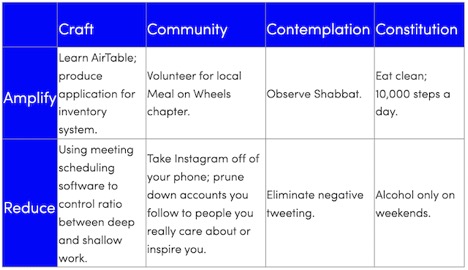This is a guest lesson from my Life of Focus co-instructor, Cal Newport. In anticipation of a new session of our popular course, he decided to share some of his experiences building a deep life. Enjoy!
Early in the pandemic, driven by the dislocation that characterized the moment, I began writing about a topic I quickly came to call “the deep life.” Though the name was new, the underlying idea was not, as few impulses are more ancient than the pursuit of a richer existence.
The instinct when talking about this topic is to resort to the lyrical: tell motivating stories, or present scenes that spark inspiration. This instinct makes sense. The deep life is nuanced and complicated. It cannot be fully reduced to practical suggestions or a step-by-step program.
And yet, this is exactly what I attempted.
Less than a month after my original post on the topic, I introduced a “30-day plan” in which you focus on four main areas in your life, identifying for each one habit to “amplify” and one behavior to “reduce.” I even presented a sample table to demonstrate the plan in action:

Later that spring, on my podcast, I elaborated this idea into something I called the “deep life bucket strategy,” which presented a two-stage process for systematically overhauling your life.
Then, over that summer, Scott Young and I completed a new online course called Life of Focus (which, I should probably mention, opens again next week to new students), that included a major module on engineering more depth into your regular routine.
To explain my contrarian shift toward the pragmatic in my treatment of this topic, I should first note that I agree that the deep life cannot be fully reduced to a system. But I’ve also come to believe that systems still have a role to play in this context, as they can help you understand this goal better fleeting moments of inspiration. This idea is familiar in theological circles. Many religions believe that although the concept of God cannot fully be understood by the human mind, and that certain ritual practices, such as daily prayers, can spark intimations of the divine that cannot be captured in third-person description.
Something similar (though less grandiose) is at play with systematic attempts to pursue the deep life. Identifying buckets, or amplifying habits, cannot by themselves guarantee a life well-lived. But they do require you to take focused action toward this objective, and it’s in this action — including the missteps and surprises — that you gain access to a richer comprehension of what this goal means to you, and what you need to achieve it.
The deep life cannot be reduced to concrete steps. But without concrete steps, you’ll never get closer to this goal.
===
Scott here. Next week, Cal and I will be reopening Life of Focus for a new session. Life of Focus is a dedicated, three-month training program for improving your depth at work and at home, letting you spend more time on the things that really matter. We hope to see you there!

 I'm a Wall Street Journal bestselling author, podcast host, computer programmer and an avid reader. Since 2006, I've published weekly essays on this website to help people like you learn and think better. My work has been featured in The New York Times, BBC, TEDx, Pocket, Business Insider and more. I don't promise I have all the answers, just a place to start.
I'm a Wall Street Journal bestselling author, podcast host, computer programmer and an avid reader. Since 2006, I've published weekly essays on this website to help people like you learn and think better. My work has been featured in The New York Times, BBC, TEDx, Pocket, Business Insider and more. I don't promise I have all the answers, just a place to start.